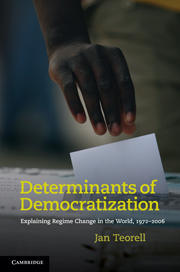Book contents
- Frontmatter
- Contents
- List of tables
- List of figures
- Acknowledgments
- Introduction
- 1 Explaining democratization
- 2 The shadow of the past: social determinants
- 3 The power of prosperity: economic determinants
- 4 The impetus from abroad: international determinants
- 5 The force from below: popular mobilization
- 6 Exogenous shocks and authoritarian regime types: institutional contingency
- 7 Conclusions
- Appendix A Data and variable definitions
- Appendix B Statistical model
- Appendix C Robustness tests
- Appendix D The pathway criterion
- References
- Index
Introduction
Published online by Cambridge University Press: 05 June 2012
- Frontmatter
- Contents
- List of tables
- List of figures
- Acknowledgments
- Introduction
- 1 Explaining democratization
- 2 The shadow of the past: social determinants
- 3 The power of prosperity: economic determinants
- 4 The impetus from abroad: international determinants
- 5 The force from below: popular mobilization
- 6 Exogenous shocks and authoritarian regime types: institutional contingency
- 7 Conclusions
- Appendix A Data and variable definitions
- Appendix B Statistical model
- Appendix C Robustness tests
- Appendix D The pathway criterion
- References
- Index
Summary
Why do some countries become democracies and others not? Why do some countries remain more democratic whereas others slide back toward authoritarianism? Are social, economic or international forces the key determinants of these processes? Are some types of authoritarian regimes more prone to democratize than others? Do actors influence democratization, or is that a structurally determined outcome? Do the same determinants affect democratization in the short-run as in the long-run? What lessons can be learned for international efforts at promoting democracy from comparative democratization studies?
In this book I address these questions by drawing on evidence from the extraordinary improvement in the realm of democracy the world has witnessed in the past 35 years or so. Starting in the Mediterranean area in 1974, Greece, Portugal and Spain overthrew longstanding dictatorships and installed popularly elected governments. After military juntas came down in Ecuador and Peru in the late 1970s, democracy profoundly swept the Latin American continent during the 1980s with the establishment of democracy in Bolivia, Argentina, Uruguay, Brazil and Chile. In Asia, the Philippine dictatorship of Ferdinand Marcos was toppled, followed by the inauguration of competitive multiparty elections in South Korea, Nepal and Bangladesh.
- Type
- Chapter
- Information
- Determinants of DemocratizationExplaining Regime Change in the World, 1972–2006, pp. 1 - 15Publisher: Cambridge University PressPrint publication year: 2010

